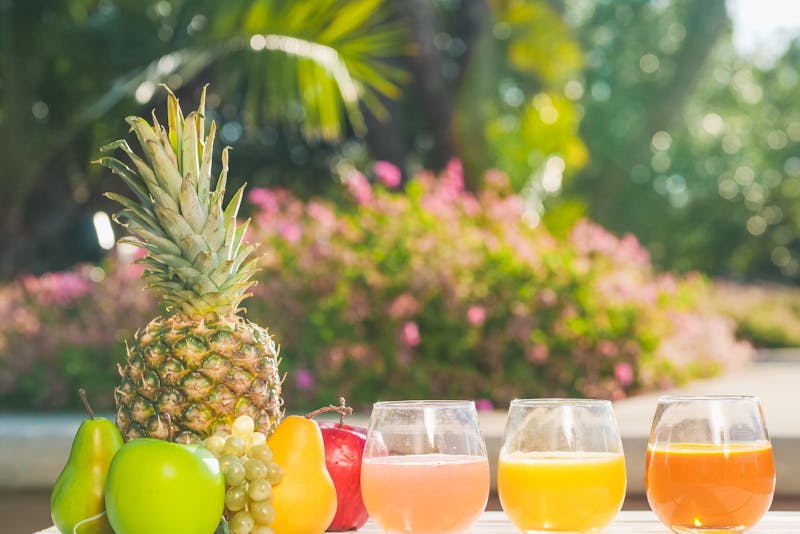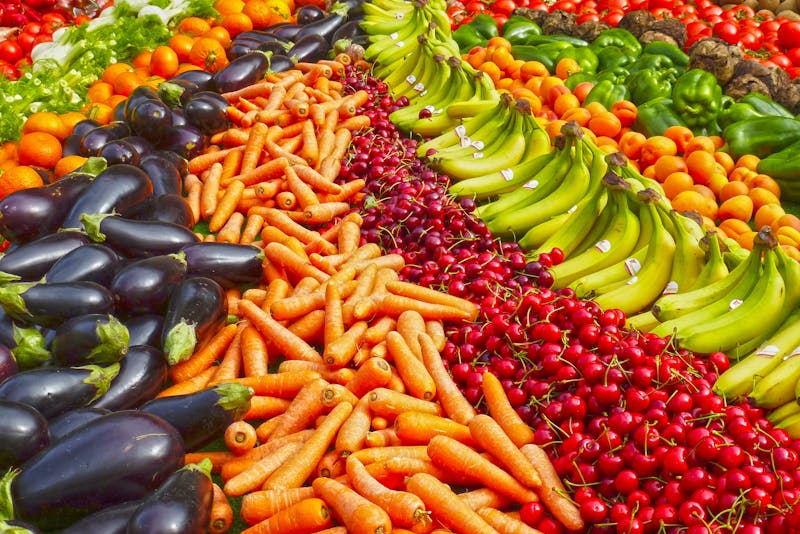- The liver detoxifies itself naturally — It doesn’t need special diets, teas, or cleanses to remove toxins; it already performs this function effectively unless there’s existing liver disease.
- Juice cleanses and restrictive detoxes can do more harm than good — They often deprive the body of essential nutrients like protein and healthy fats, offering no proven benefits for liver repair.
- Herbal supplements are not always safe or effective — Popular “liver cleansing” herbs like milk thistle and turmeric lack consistent scientific backing, and misuse can even cause liver damage.
- Long-term lifestyle habits matter most — Sustainable liver health depends on balanced nutrition, limited alcohol intake, regular exercise, and weight management—not quick fixes.
- Beware of marketing hype — Many detox products rely on vague claims, emotional appeals, and testimonials rather than clinical research to drive sales.
- A balanced diet supports natural liver function — Whole foods such as leafy greens, cruciferous vegetables, fatty fish, garlic, and moderate coffee intake promote liver health through anti-inflammatory and metabolic benefits.
The idea of a “liver cleansing diet” has gained immense popularity in recent years. From social media influencers to wellness blogs, many sources claim that certain foods, juices, or detox programmes can flush out toxins and reset your liver. For health-conscious people, this sounds appealing—after all, the liver plays a critical role in filtering the blood, metabolising nutrients, and breaking down harmful substances. But how much of this is fact, and how much is marketing hype?
In reality, the liver is a remarkably resilient organ that already has the ability to detoxify itself. While diet and lifestyle choices certainly influence liver health, the concept of a quick fix or “cleanse” often oversimplifies how the body truly works. This article takes a closer look at common myths surrounding liver cleansing diets, what the science actually says, and practical ways to support your liver without falling for fads.
Why Is the Liver So Important?
The liver is often described as the body’s “chemical factory.” It carries out over 500 functions, many of which are essential for survival. Beyond detoxification, it helps process fats, proteins, and carbohydrates, stores vitamins and minerals, and even produces bile for digestion.
One of its most vital roles is filtering toxins from the bloodstream—whether they come from alcohol, medications, or environmental exposure. Given this responsibility, it’s easy to see why so many people are concerned about liver health. However, it’s important to understand that the liver is self-cleaning. It doesn’t require drastic detoxes or restrictive diets to do its job. Instead, it benefits most from consistent, balanced nutrition and healthy lifestyle habits.
Myth 1: The Liver Needs External Detoxing

The claim: Many popular diet trends suggest that the liver becomes overloaded with toxins and needs outside help to “detox” through juice cleanses, herbal teas, or fasting regimens.
The fact: The liver already has built-in detoxification processes. It breaks down toxins into water-soluble compounds, which the body can excrete through urine or bile. Unless someone has advanced liver disease, there’s no evidence to suggest that external detoxes are necessary.
The human body is equipped with natural defences. When functioning normally, the liver, kidneys, lungs, and skin all contribute to removing waste. Detox diets might make people feel lighter or more energetic in the short term, but that’s often due to cutting out processed foods, alcohol, and excess sugar—rather than the “cleanse” itself.
Myth 2: Juice Cleanses Can Repair the Liver
The claim: Advocates of juice fasting often promote it as a way to flush out toxins and give the liver a break.
The fact: While fruit and vegetable juices can provide vitamins and antioxidants, juice cleanses are not scientifically proven to cleanse or repair the liver. In fact, relying solely on juice for extended periods can deprive the body of protein, fibre, and healthy fats—nutrients that the liver also requires for optimal function.
Research suggests that diets high in whole foods such as leafy greens, legumes, and lean proteins support long-term liver health far more effectively than extreme juice fasts. Moderation, balance, and variety remain the best guiding principles.
Myth 3: Herbal Supplements Always Support the Liver
The claim: Herbal supplements like milk thistle, turmeric, or dandelion root are often marketed as natural liver cleansers.
The fact: While some herbs have shown potential in supporting liver function, not all claims are backed by strong scientific evidence. For example, milk thistle has been studied for liver disease, but results remain inconclusive. More importantly, herbal supplements are not regulated as strictly as pharmaceuticals, which means quality and dosage can vary significantly.
In some cases, excessive or unsafe use of supplements has even been linked to liver damage. For health-conscious individuals, it’s critical to approach supplements with caution, seek professional advice, and focus on a whole-food diet before turning to unproven remedies.
Myth 4: A Liver Cleansing Diet Can Reverse Damage Overnight
The claim: Some diets promise to reverse years of liver damage in just a few weeks.
The fact: Liver health doesn’t work on such a short timeline. While the liver has remarkable regenerative capabilities, reversing damage takes consistent effort over time. Conditions like fatty liver disease or alcohol-related liver damage cannot be undone with a quick cleanse.
Instead, long-term improvements come from:
- Reducing alcohol intake or eliminating it altogether
- Eating a balanced diet rich in whole foods
- Maintaining a healthy weight
- Exercising regularly
- Managing underlying health conditions such as diabetes
Consistency, not quick fixes, is what helps the liver recover and thrive.
Myth 5: The Liver Cleansing Diet Works for Everyone
The claim: Anyone can benefit from following a liver cleansing diet.
The fact: There is no one-size-fits-all solution. The impact of diet on the liver depends on individual health conditions, genetics, and lifestyle. For example, someone with non-alcoholic fatty liver disease may need a targeted plan developed by a healthcare professional rather than a generalised cleanse.
In fact, for certain people, restrictive diets can do more harm than good. Those with underlying health conditions, nutrient deficiencies, or a history of eating disorders should be especially cautious.
What Actually Supports Liver Health?

Instead of following fads, health-conscious people should focus on sustainable habits that science has shown to protect and strengthen the liver.
Dietary Strategies
- Eat plenty of fruits and vegetables: High in antioxidants and fibre, these foods reduce oxidative stress and inflammation.
- Prioritise lean protein: Sources like fish, chicken, legumes, and tofu support tissue repair and metabolism.
- Choose healthy fats: Avocados, olive oil, and nuts promote overall metabolic health.
- Limit added sugar and processed foods: These contribute to fatty liver and obesity.
- Stay hydrated: Adequate water intake helps the body flush waste naturally.
Lifestyle Strategies
- Limit or avoid alcohol: Alcohol is one of the leading causes of liver disease.
- Exercise regularly: Physical activity reduces fat buildup in the liver and improves insulin sensitivity.
- Maintain a healthy weight: Being overweight increases the risk of fatty liver disease.
- Get regular check-ups: Routine blood tests can detect liver problems early.
How Marketing Exploits Liver Cleansing Diet Myths
The wellness industry is booming, and liver cleansing diets are often promoted with persuasive language and celebrity endorsements. However, many of these claims are designed more to sell products than to provide genuine health benefits.
Common tactics include:
- Using vague terms like “toxins” without a scientific explanation
- Promoting before-and-after testimonials instead of clinical research
- Selling expensive supplements or juice packages with little regulation
- Creating a sense of urgency by suggesting the body is overloaded with toxins
For health-conscious readers, being able to spot these tactics is the first step towards making more informed choices.
Can Certain Foods Help the Liver?
Yes—but not in the way fad diets often claim. Instead of “flushing out” toxins, certain foods support the liver by reducing inflammation, aiding digestion, and improving metabolic processes.
Some beneficial options include:
- Leafy greens: Spinach, kale, and rocket provide chlorophyll, which may help neutralise harmful compounds.
- Cruciferous vegetables: Broccoli and Brussels sprouts support natural detoxification enzymes.
- Fatty fish: Salmon and sardines contain omega-3 fatty acids that reduce fat buildup in the liver.
- Coffee (in moderation): Studies show it may reduce the risk of liver fibrosis and cirrhosis.
- Garlic and onions: Rich in sulphur compounds, they assist in detox pathways.
The key is to incorporate these foods into a balanced diet rather than relying on them as miracle cures.
The Role of Professional Guidance
When in doubt, it’s always best to consult a healthcare professional before starting any new diet or supplement. Doctors, dietitians, or nutritionists can provide personalised advice based on your health profile, medical history, and goals.
For people with existing liver conditions such as hepatitis, cirrhosis, or fatty liver disease, self-prescribing a liver cleansing diet could delay necessary treatment. Professional care ensures that lifestyle changes are both safe and effective.
Liver Cleansing Diet: Separating Facts from Fads
At the heart of the liver cleansing diet debate is the need to distinguish between marketing gimmicks and real science. While the idea of “detoxing” sounds appealing, the truth is that the liver doesn’t need gimmicks to function well. What it does need is consistent support through a balanced diet, reduced alcohol intake, and a healthy lifestyle.
For health-conscious Australians looking to protect their liver, the best path forward is not a quick cleanse but a long-term commitment to better living. By separating myths from facts, we empower ourselves to make choices that genuinely improve health and well-being.
Is Fasting Beneficial for Liver Health?
Fasting is often promoted as a way to reset the body, including the liver. Intermittent fasting and time-restricted eating have gained popularity in recent years, with some studies suggesting potential benefits for metabolic health. However, it’s important to understand what fasting can and cannot do for the liver.
Research shows that intermittent fasting may help reduce fat accumulation in the liver, lower inflammation, and improve insulin sensitivity—all of which are linked to a reduced risk of non-alcoholic fatty liver disease. But this does not mean that fasting automatically “cleanses” the liver in the way fad diets suggest. Results depend on how fasting is approached and what foods are consumed during eating windows.
Key considerations include:
- Focus on quality nutrition: Breaking a fast with highly processed or sugary foods negates potential benefits.
- Individual tolerance: Not everyone responds to fasting the same way; some may feel fatigued or irritable.
- Medical supervision: People with diabetes, liver disease, or other health conditions should consult a doctor before attempting fasting.
Fasting may support liver health as part of a balanced lifestyle, but it should not be seen as a shortcut or miracle fix.
Conclusion
The fascination with liver cleansing diets reflects a broader desire for quick fixes in health and wellness. Yet the evidence makes it clear: your liver is already capable of detoxifying itself, provided you give it the right environment. Juices, herbs, and expensive detox packages may sound appealing, but they are no substitute for a balanced diet, regular exercise, and mindful lifestyle choices.
Instead of chasing fads, focus on daily habits that build resilience over time. This approach not only supports your liver but also strengthens your overall health. By embracing fact over fiction, health-conscious people can take charge of their well-being without being misled by empty promises.

